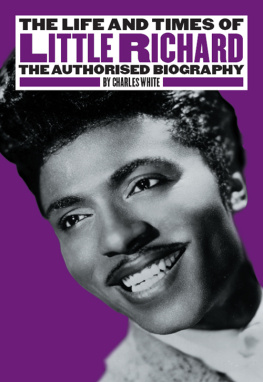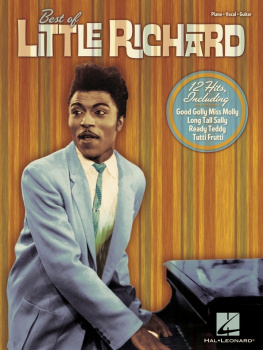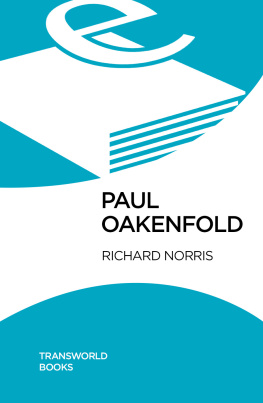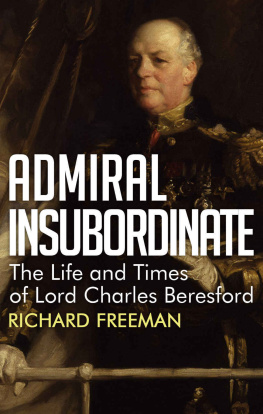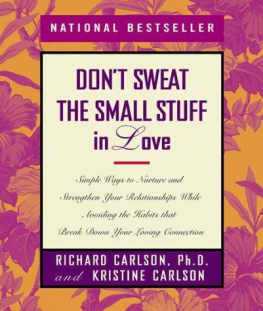
Copyright 1984 by Richard Penniman, Charles White & Robert A. Blackwell
New material copyright 1994 and 2002 Charles White
This edition 2013 Omnibus Press
(A Division of Music Sales Limited, 14-15 Berners Street, London W1T 3LJ)
Cover & Book designed by Chlo Alexander
Picture research by Charles White & David Brolin
EISBN: 978-1-78323-014-3
The Author hereby asserts his / her right to be identified as the author of this work in accordance with Sections 77 to 78 of the Copyright, Designs and Patents Act 1988.
All rights reserved. No part of this book may be reproduced in any form or by any electronic or mechanical means, including information storage and retrieval systems, without permission in writing from the publisher, except by a reviewer who may quote brief passages.
Every effort has been made to trace the copyright holders of the photographs in this book, but one or two were unreachable. We would be grateful if the photographers concerned would contact us.
A catalogue record of this book is available from the British Library.
Tutti Frutti by Richard Penniman, J. Lubin & La Bostrie, copyright 1955 Venice Music, Inc. ATV Music Corp. All rights reserved. Used by persmission of ATV Music Corp.
Long Tall Sally by Enortis Johnson, Richard Penniman & Robert A. Blackwell, copyright 1956 Venice Music, Inc. ATV Music Corps. All rights reserved. Used by permission of ATV Music Corp.
Rip It Up by Robert A. Blackwell & John Marascalco, copyright 1956 Venice Music, Inc. ATV Music Corp. All rights reserved. Used by persmission of ATV Music Corp.
Art Rupe quotes taken from Art Rupe, The Story of Specialty Records (Ace CDCH2 542)thanks to the interviewer and writer, Pete Frame.
For all your musical needs including instruments, sheet music and accessories, visit www.musicroom.com
For on-dem978-1-78323-014-3and sheet music straight to your home printer, visit www.sheetmusicdirect.com
This book is dedicated to Leva Mae Penniman, Little Richards mother, and one of the most beautiful and spiritually dignified people I have ever met. Left a widow with twelve children, she overcame all difficulties and reared them successfully through her tremendous strength of character and firm belief in the power and goodness of God. Until her death in January 1984 at the age of seventy-one, she remained the fulcrum of the Penniman familys life. The secure home and never-failing love that she always provided for Richard during his RocknRoll career in the Fifties, Sixties, and Seventies were the key factors that enabled him to survive the excesses of life as a superstar, unlike so many of his rock contemporaries.
May the Lord bless and keep you, Leva Mae.
Foreword
At last! A book on Little Richard.
I have these fantastic memories from a very early age, singing Tutti Frutti at schoolit was a big rave at the time. The first song I ever sang in public was Long Tall Sally, in a Butlins holiday camp talent competition!
When the Beatles were first starting we performed with Richard in Liverpool and Hamburg, and we became close friends. Richard is one of the greatest kings of RocknRoll. Hes a great guy and hes my friend today.
Paul McCartney
Preface
This is the story of Little Richard. Born Richard Wayne Penniman, he exploded onto the American music scene in 1955 with Awop-Bop-a-Loo-Mop Alop-Bam-Boom demolishing established musical structure and giving a whole generation a clarion-call to shake off the chains of repression.
With songs like Tutti Frutti, Long Tall Sally, Ready Teddy, Lucille, Good Golly Miss Molly, and many many others, he single-handedly laid the foundations of a new music form, RocknRoll. His powerhouse voice and outlandish appearance gave the twentieth century a freer spirit, allowing later rock legends like Paul McCartney, Tom Jones, Elvis Presley, Mick Jagger, David Bowie, and Michael Jackson to do their own thing. Yet he has always been treated as a way-out demento, beyond ordinary comprehension or serious analysis. Until now
Little Richard brought the races together in a common admiration for his music. Born in Macon, Georgia, the heart of Americas gospel belt, he twice discarded superstardom for the church, typifying the conflict between sacred and secular music which is built into the black culture and which especially affects its greatest singers. The only reason that he is not a superstar today is that he decided not to be.
What he did was particularly amazing because he didnt have the experience of others to draw on. He had to go through it all for the first time, establish the rules, and live all the mistakes that later rock stars were able to avoid. And he is still alive and vital, unlike many of them.
Racism is woven so deeply into the fabric of America that even decent people dont realize that their attitudes are racist and that they are contributing to the outrageous holding-down of people based on their color. The creators and innovators of Afro-American music forms, the only significant musical revolution since the Strauss waltzes, should be venerated and honored. But Paul Whiteman was crowned King of Jazz, Benny Goodman the King of Swing, and Elvis Presley the King of RocknRoll, while the black geniuses like Duke Ellington, Count Basie, Billie Holiday, Joe Turner, and Little Richard, who created Americas only classical music form, have always been denied true recognition in their own country.
Little Richard earned a lot of money as a RocknRoll singer. But it was only a fraction of what he would have made if attitudes toward him had not been so deeply affected by the color of his skin. Richard has always had a special magnetism, bringing his audiences together into one entity. Shining like a quasar, the most intensely radiant object in the cosmos, he seems to tap a mystical source of mental power that is only accessible to great preachers and shamans. Richard embodies everything that is America not just Black America. Little Richard is America.
This is the story of a unique and dualistic psyche, an uncontrollable genius whose influence on Western culture is incalculable, but whose personal life has been tormented by outrageous and freakish sexuality and a hunger for public adulation. As a totally new phenomenon in the Fifties, he caught every stigma and label that the press could lay on a man. Yet at the same time, Richards desire to be a minister of God and a prophet of peace among the races epitomizes mans crucial strugglethe battle between the good and the evil that exists in all of us.
Preface To The Third Edition
The publication of the first edition of this book in America in 1984 brought Little Richard back from virtual obscurity to be given just credit as a great entertainer and a unique creative force in twentieth century music. Far from being a has-been, Little Richard is still bursting with creative energy and is as great a showman as you could wish to see.
Since 1984 Richard has gone into the movies playing a brilliant part in Down And Out In Beverly Hills, for which he also sang the theme song, presented his own TV show, returned to the recording studio, and played live all over the world. In 1993 he attended the Inauguration of President Clinton as a guest performer, received a Grammy Award for his contribution to American music, and gained a platinum disc for Shake It All About, his album of music for children. He continues to be in demand for recording, for movies, for TV, for pop videos (

